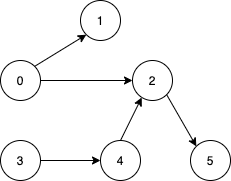the second one in Biweekly Contest 33.
Difficulty : Medium
Related Topics : Graph
Given a directed acyclic graph, with
nvertices numbered from0ton-1, and an arrayedgeswhereedges[i] = [fromi, toi]represents a directed edge from node fromi to node toi.Find the smallest set of vertices from which all nodes in the graph are reachable. It's guaranteed that a unique solution exists.
Notice that you can return the vertices in any order.
Input: n = 6, edges = [[0,1],[0,2],[2,5],[3,4],[4,2]] Output: [0,3] Explanation: It's not possible to reach all the nodes from a single vertex. From 0 we can reach [0,1,2,5]. From 3 we can reach [3,4,2,5]. So we output [0,3].Input: n = 5, edges = [[0,1],[2,1],[3,1],[1,4],[2,4]] Output: [0,2,3] Explanation: Notice that vertices 0, 3 and 2 are not reachable from any other node, so we must include them. Also any of these vertices can reach nodes 1 and 4.
2 <= n <= 10^51 <= edges.length <= min(10^5, n * (n - 1) / 2)edges[i].length == 20 <= fromi, toi < n- All pairs (
fromi, toi) are distinct.
- mine
- Java
- TopologicalSort
Runtime: 14 ms, faster than 83.37%, Memory Usage: 142.7 MB, less than 16.80% of Java online submissions//O(N)time //O(N)space public List<Integer> findSmallestSetOfVertices(int n, List<List<Integer>> edges) { int[] arr = new int[n]; for(List<Integer> edge : edges){ arr[edge.get(1)]++; } List<Integer> res = new ArrayList<>(); for(int i = 0; i < n; i++){ if(arr[i] == 0){ res.add(i); } } return res; }
- TopologicalSort
- Java

